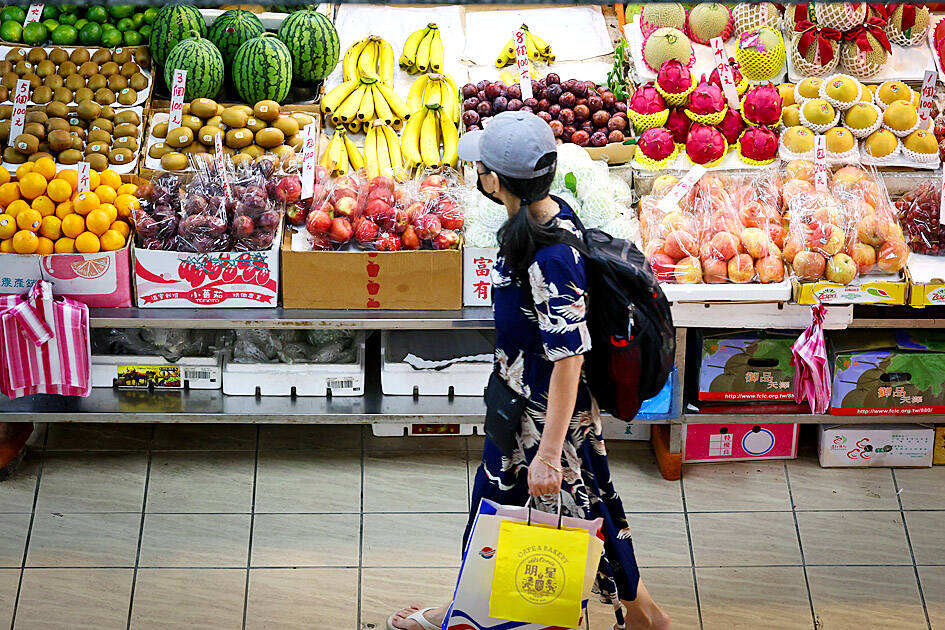The consumer price index (CPI) increased at a slower annual pace last month, gaining 2.02 percent, while the core CPI rose 2.57 percent year-on-year after volatile items were excluded, as inflationary pressures stabilized, the Directorate-General of Budget, Accounting and Statistics (DGBAS) said yesterday.
The inflation readings remained above the 2 percent target for the 22nd month in a row, but the month-on-month slowdown could give the central bank reason to halt interest rate hikes later this month to support the economy.
“Advances in entertainment and dining out charges, as well as rent rates continued to drive up the CPI, even though international oil and raw material prices contracted amid global economic uncertainty,” DGBAS official Tsao Chih-hung (曹志弘) told an online news briefing.

Photo: CNA
The headline inflationary gauge declined 0.07 percent from a month earlier and shed 0.11 percent after seasonal adjustments, Tsao said, adding that it would likely pick up slightly this month due to the Dragon Boat Festival.
Central bank Governor Yang Chin-long (楊金龍) earlier told a hearing at the Legislative Yuan that the central bank would raise interest rates again this month if the core CPI, a more reliable long-term price tracker, continued to rise.
The core reading rose 2.72 percent year-on-year in April on the back of the Tomb Sweeping Day break, but slowed to 2.57 percent last month, enabling the central bank to put policy rate increases on hold.
The central bank said it would also factor in monetary moves by major economies to address repercussions related to interest rate differences.
Last month’s CPI data suggest that inflationary pressures lingered, especially for frequently purchased items, which account for a bigger share of low-income households’ purchases, Tsao said.
Education and entertainment overtook food as the biggest CPI driver with a 3.01 percent increase, as people resumed normal activities after COVID-19 restrictions, he said, adding that price hikes for services are unlikely to drop even when things become more affordable.
Food costs rose 2.96 percent, as egg, meat, cooking oil and grain prices increased noticeably, muting declines in vegetable and fruit prices amid stable supply, Tsao said.
Prices of miscellaneous items rose 2.69 percent as employers increased the wages of foreign domestic helpers and care workers, he said.
The producer price index (PPI), which measures price changes from the seller’s perspective, contracted 3.75 percent following a revised 2.24 percent fall in April, after demand for oil, coal and base metal products dropped, in line with poor economic showings, Tsao said.
In the first five months of the year, the CPI grew 2.44 percent, while the PPI grew a fractional 0.67 percent, DGBAS data showed.

Semiconductor shares in China surged yesterday after Reuters reported the US had ordered chipmaking giant Taiwan Semiconductor Manufacturing Co (TSMC, 台積電) to halt shipments of advanced chips to Chinese customers, which investors believe could accelerate Beijing’s self-reliance efforts. TSMC yesterday started to suspend shipments of certain sophisticated chips to some Chinese clients after receiving a letter from the US Department of Commerce imposing export restrictions on those products, Reuters reported on Sunday, citing an unnamed source. The US imposed export restrictions on TSMC’s 7-nanometer or more advanced designs, Reuters reported. Investors figured that would encourage authorities to support China’s industry and bought shares

FLEXIBLE: Taiwan can develop its own ground station equipment, and has highly competitive manufacturers and suppliers with diversified production, the MOEA said The Ministry of Economic Affairs (MOEA) yesterday disputed reports that suppliers to US-based Space Exploration Technologies Corp (SpaceX) had been asked to move production out of Taiwan. Reuters had reported on Tuesday last week that Elon Musk-owned SpaceX had asked their manufacturers to produce outside of Taiwan given geopolitical risks and that at least one Taiwanese supplier had been pushed to relocate production to Vietnam. SpaceX’s requests place a renewed focus on the contentious relationship Musk has had with Taiwan, especially after he said last year that Taiwan is an “integral part” of China, sparking sharp criticism from Taiwanese authorities. The ministry said

US President Joe Biden’s administration is racing to complete CHIPS and Science Act agreements with companies such as Intel Corp and Samsung Electronics Co, aiming to shore up one of its signature initiatives before US president-elect Donald Trump enters the White House. The US Department of Commerce has allocated more than 90 percent of the US$39 billion in grants under the act, a landmark law enacted in 2022 designed to rebuild the domestic chip industry. However, the agency has only announced one binding agreement so far. The next two months would prove critical for more than 20 companies still in the process

CHANGING JAPAN: Nvidia-powered AI services over cellular networks ‘will result in an artificial intelligence grid that runs across Japan,’ Nvidia’s Jensen Huang said Softbank Group Corp would be the first to build a supercomputer with chips using Nvidia Corp’s new Blackwell design, a demonstration of the Japanese company’s ambitions to catch up on artificial intelligence (AI). The group’s telecom unit, Softbank Corp, plans to build Japan’s most powerful AI supercomputer to support local services, it said. That computer would be based on Nvidia’s DGX B200 product, which combines computer processors with so-called AI accelerator chips. A follow-up effort will feature Grace Blackwell, a more advanced version, the company said. The announcement indicates that Softbank Group, which until early 2019 owned 4.9 percent of Nvidia, has secured a